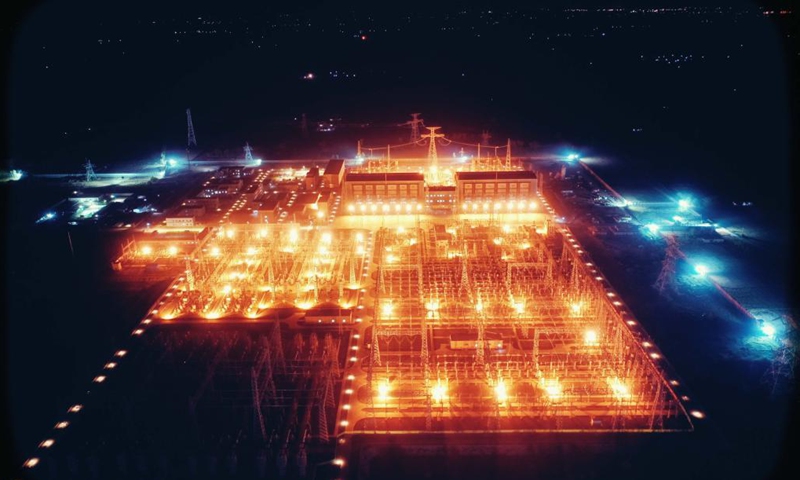
Photo taken on April 10, 2021 shows a night view of the Lahore converter station of the ±660kV Matiari-Lahore high-voltage direct current (HVDC) transmission project under the China-Pakistan Economic Corridor (CPEC) in Pakistan's eastern Punjab Province. The transmission ceremony of the project was held simultaneously in Islamabad and China's Beijing through video link on June 25, 2021.Photo:Xinhua
Accusation by a US-based contractor that Chinese tech giant Huawei had set up a "backdoor" to spy on Pakistanis has drawn growing attention with the political implications behind the scene.
California-based contractor Business Efficiency Solutions LLC (BES) filed a lawsuit in California district court accusing Huawei of not only stealing its technology, but also of creating a "backdoor" in a safe-cities surveillance project located in Pakistan's second largest city of Lahore, The Wall Street Journal reported.
BES said in the lawsuit that Huawei required it to set up a system in China that gives Huawei access to sensitive information about citizens and government officials in Lahore, but Huawei claimed that the system in China was only a test version and it is "impossible for Huawei to extract data from the customer's live network," according to the WSJ report.
The US has long accused Huawei of installing backdoors in its systems, but Huawei always denied the allegations, citing the absence of any evidence of Huawei using backdoors to spy on other countries. The lawsuit this time may represent a rare example that involves specific project and companies when it comes to the backdoor allegation. However, given the complicated geopolitical background, it is hard to tell whether the allegations raised by BES are based on business disputes or whether they have an ulterior motive.
It should be noted that Huawei and BES also sued each other in Pakistan, and BES is reportedly no longer operational and has no revenue.
Many have stated that it appears unusual that Pakistan is involved in the lawsuit. Over the past seven decades, China and Pakistan have formed a strong and close relationship, which saw strategic partnership and cooperation flourish in almost every field. Pakistan is one of the most active participants in the Belt and Road Initiative, and there are multiple areas of economic cooperation and development projects between China and Pakistan. Pakistan is also one of the markets where Huawei enjoys the fastest development.
Huawei's software and systems are widely used in countries around the world. With the launch of the Harmony system, it is expected that there will be more and more countries choosing Huawei software and systems. Whether Huawei wins the lawsuit or not, the accusations may not only affect Huawei's global business but also be used to drive a wedge between China and Pakistan. Such calculations may help answer the question as to whether there was any political motivation behind the lawsuit.
Yet, we believe that high levels of mutual trust between China and Pakistan will be sufficient to allow bilateral economic cooperation to withstand the impact of groundless accusations.
Some US or Western companies vying to access the South Asian market have been envious of China's long-term economic cooperation with Pakistan. Nevertheless, it is important to note that their cooperation projects don't reject the participation of companies from other countries. But the precondition is that they have the willingness to cooperation instead of smearing and squeezing Chinese companies out through improper means.






